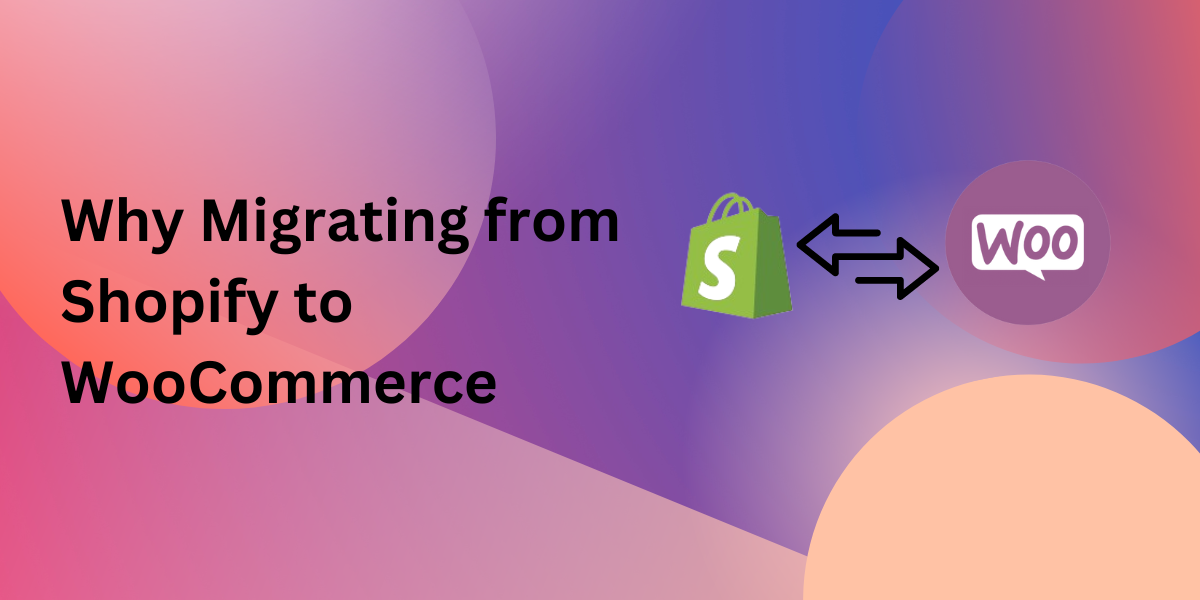In the world of eCommerce, businesses need a platform that not only meets their current needs but also offers flexibility for future growth. Shopify and WooCommerce are two leading eCommerce solutions, each with its unique features. While Shopify is known for its simplicity, many store owners are opting to migrate to WooCommerce for its greater customization options, cost-effectiveness, and enhanced control over their online stores. In this article, we’ll explore the benefits of migrating from Shopify to WooCommerce and why it might be the right choice for your business.
What is WooCommerce?
WooCommerce is a powerful, open-source eCommerce plugin for WordPress, one of the most widely used website platforms in the world. WooCommerce enables you to create a fully customizable online store, making it ideal for businesses that want more control over the design, functionality, and overall experience of their eCommerce site.
Why Migrate from Shopify to WooCommerce?
1. Greater Customization and Flexibility
One of the main reasons to migrate from Shopify to WooCommerce is the level of customization WooCommerce offers. With WooCommerce, you have access to thousands of plugins and themes that allow you to tailor your online store to your specific needs. Unlike Shopify, where customization is limited by built-in features and third-party apps, WooCommerce gives you complete control over how your store looks and functions.
For example, if you need to integrate a specific payment gateway or customize the checkout process, WooCommerce provides the flexibility to do so through its vast ecosystem of plugins and add-ons. This customization helps enhance the user experience and boosts sales by allowing you to build a store that meets the exact requirements of your target audience.
2. Cost-Effectiveness
Another key advantage of WooCommerce is cost-effectiveness. Shopify charges monthly fees that vary depending on the plan you choose, with additional transaction fees if you don’t use Shopify Payments. These costs can add up quickly, especially for small businesses.
WooCommerce, on the other hand, is a free plugin that you can install on your WordPress site. While there are some costs associated with hosting, domain names, and premium themes or plugins, WooCommerce tends to be more budget-friendly in the long run, especially for businesses with growing sales volumes. The absence of mandatory transaction fees also adds to its cost-efficiency.
3. Full Control Over Your Store
WooCommerce offers store owners complete control over their eCommerce site. With Shopify, you’re limited to their hosted environment, which can restrict your ability to access certain features or make advanced customizations.
In contrast, WooCommerce gives you control over everything from hosting and security to performance optimization. This allows you to choose your hosting provider, integrate custom caching solutions, and ensure that your store is optimized for speed and performance. Additionally, you own all your data, which is not always the case with Shopify.
4. Scalability and Growth Potential
As your business grows, you’ll need a platform that can scale with you. WooCommerce is known for its ability to handle large product catalogs and high traffic without any issues. Since WooCommerce runs on WordPress, it can leverage the platform’s extensive features to handle a high number of visitors, orders, and products.
Shopify can also scale, but scaling with WooCommerce is more flexible as you can adjust your hosting, add specific plugins, and even use third-party solutions for order management, shipping, and inventory tracking. WooCommerce also makes it easier to run multiple storefronts or manage complex business needs, such as multi-language or multi-currency options.
5. SEO and Marketing Benefits
WooCommerce excels when it comes to SEO. Since it is built on WordPress, one of the best CMS platforms for SEO, WooCommerce makes it easier to optimize your online store for search engines. You can use a wide range of SEO plugins, such as Yoast SEO, to optimize product pages, blogs, and content for better rankings on search engines like Google.
In addition to SEO, WooCommerce offers superior control over marketing efforts. Unlike Shopify, which has more limited integrations with marketing tools, WooCommerce allows you to integrate with almost any marketing platform you choose. Whether you need advanced email marketing, customer relationship management (CRM) systems, or detailed analytics, WooCommerce gives you the freedom to build a marketing stack that works for you.
6. Product and Inventory Management
WooCommerce makes product and inventory management seamless. With the flexibility of its open-source nature, WooCommerce can accommodate different types of products, including digital downloads, physical products, and memberships.
Managing inventory in WooCommerce is straightforward, and you can add advanced inventory management tools through plugins if needed. WooCommerce also supports product variations, making it ideal for stores with complex product catalogs. Additionally, WooCommerce’s open nature allows integration with third-party inventory management tools, giving you more options compared to Shopify.
7. Data Ownership and Security
Data ownership is a significant concern for many businesses. When you use Shopify, your data is hosted on their servers, and while Shopify takes security seriously, you still rely on their infrastructure for data protection.
With WooCommerce, you own your data and have full control over its security. You can implement your own security protocols, back up your store regularly, and ensure compliance with data protection regulations. This level of control is particularly important for businesses that handle sensitive customer data, such as payment details or personal information.
How to Migrate from Shopify to WooCommerce
Migrating from Shopify to WooCommerce is a straightforward process, thanks to tools like the Shopify to WooCommerce migration plugin. This plugin simplifies the migration process, ensuring that your product data, customer information, and order history are seamlessly transferred to your new WooCommerce store.
Here are the basic steps for migrating:
- Set Up Your WooCommerce Store: Install WordPress, set up WooCommerce, and choose a hosting provider that can handle your store’s traffic.
- Install the Shopify Migration Plugin: Install the Migrate & Import Shopify to WooCommerce plugin to start the migration process.
- Transfer Your Data: Use the plugin to transfer your product data, customer information, and order history from Shopify to WooCommerce.
- Customize Your WooCommerce Store: After migration, customize your WooCommerce store to match your brand, and configure plugins for added functionality.
- Test Your Store: Ensure everything has migrated correctly and test the store to make sure it’s functioning as expected.
Conclusion
Migrating from Shopify to WooCommerce offers a host of benefits, including greater customization, cost-effectiveness, control over your store, and enhanced SEO and marketing opportunities. With tools like the Migrate & Import Shopify to WooCommerce plugin, the migration process is simple, and you can start reaping the rewards of WooCommerce’s flexibility and scalability in no time.




أنابيب النحاس-النيكل في العراق يوفر مصنع إيليت بايب أنابيب النحاس-النيكل التي تشتهر بمقاومتها الممتازة للتآكل ومتانتها، مما يجعلها مثالية للتطبيقات البحرية والصناعية. تم تصميم هذه الأنابيب بدقة لتلبية المتطلبات العالية لمختلف الصناعات. كأحد أكثر المصانع موثوقية في العراق، يضمن مصنع إيليت بايب أن أنابيب النحاس-النيكل لدينا تقدم أداءً فائقًا وعمرًا طويلاً. لمزيد من التفاصيل، قم بزيارة elitepipeiraq.com.